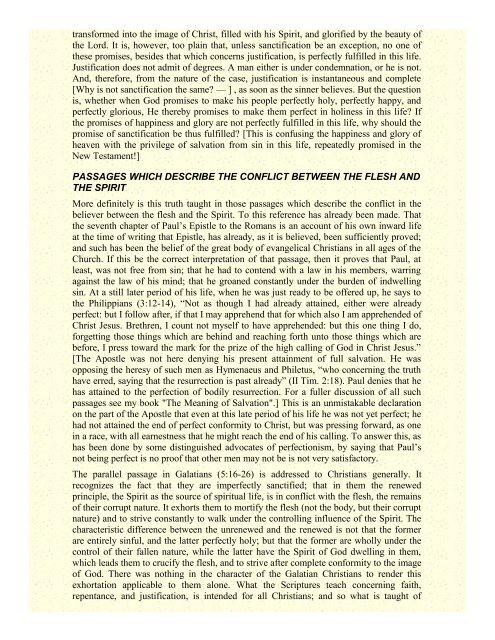2. The Meaning of Sanctification - Enter His Rest
2. The Meaning of Sanctification - Enter His Rest
2. The Meaning of Sanctification - Enter His Rest
Create successful ePaper yourself
Turn your PDF publications into a flip-book with our unique Google optimized e-Paper software.
transformed into the image <strong>of</strong> Christ, filled with his Spirit, and glorified by the beauty <strong>of</strong><br />
the Lord. It is, however, too plain that, unless sanctification be an exception, no one <strong>of</strong><br />
these promises, besides that which concerns justification, is perfectly fulfilled in this life.<br />
Justification does not admit <strong>of</strong> degrees. A man either is under condemnation, or he is not.<br />
And, therefore, from the nature <strong>of</strong> the case, justification is instantaneous and complete<br />
[Why is not sanctification the same? — ] , as soon as the sinner believes. But the question<br />
is, whether when God promises to make his people perfectly holy, perfectly happy, and<br />
perfectly glorious, He thereby promises to make them perfect in holiness in this life? If<br />
the promises <strong>of</strong> happiness and glory are not perfectly fulfilled in this life, why should the<br />
promise <strong>of</strong> sanctification be thus fulfilled? [This is confusing the happiness and glory <strong>of</strong><br />
heaven with the privilege <strong>of</strong> salvation from sin in this life, repeatedly promised in the<br />
New Testament!]<br />
PASSAGES WHICH DESCRIBE THE CONFLICT BETWEEN THE FLESH AND<br />
THE SPIRIT<br />
More definitely is this truth taught in those passages which describe the conflict in the<br />
believer between the flesh and the Spirit. To this reference has already been made. That<br />
the seventh chapter <strong>of</strong> Paul’s Epistle to the Romans is an account <strong>of</strong> his own inward life<br />
at the time <strong>of</strong> writing that Epistle, has already, as it is believed, been sufficiently proved;<br />
and such has been the belief <strong>of</strong> the great body <strong>of</strong> evangelical Christians in all ages <strong>of</strong> the<br />
Church. If this be the correct interpretation <strong>of</strong> that passage, then it proves that Paul, at<br />
least, was not free from sin; that he had to contend with a law in his members, warring<br />
against the law <strong>of</strong> his mind; that he groaned constantly under the burden <strong>of</strong> indwelling<br />
sin. At a still later period <strong>of</strong> his life, when he was just ready to be <strong>of</strong>fered up, he says to<br />
the Philippians (3:12-14), “Not as though I had already attained, either were already<br />
perfect: but I follow after, if that I may apprehend that for which also I am apprehended <strong>of</strong><br />
Christ Jesus. Brethren, I count not myself to have apprehended: but this one thing I do,<br />
forgetting those things which are behind and reaching forth unto those things which are<br />
before, I press toward the mark for the prize <strong>of</strong> the high calling <strong>of</strong> God in Christ Jesus.”<br />
[<strong>The</strong> Apostle was not here denying his present attainment <strong>of</strong> full salvation. He was<br />
opposing the heresy <strong>of</strong> such men as Hymenaeus and Philetus, “who concerning the truth<br />
have erred, saying that the resurrection is past already” (II Tim. 2:18). Paul denies that he<br />
has attained to the perfection <strong>of</strong> bodily resurrection. For a fuller discussion <strong>of</strong> all such<br />
passages see my book "<strong>The</strong> <strong>Meaning</strong> <strong>of</strong> Salvation".] This is an unmistakable declaration<br />
on the part <strong>of</strong> the Apostle that even at this late period <strong>of</strong> his life he was not yet perfect; he<br />
had not attained the end <strong>of</strong> perfect conformity to Christ, but was pressing forward, as one<br />
in a race, with all earnestness that he might reach the end <strong>of</strong> his calling. To answer this, as<br />
has been done by some distinguished advocates <strong>of</strong> perfectionism, by saying that Paul’s<br />
not being perfect is no pro<strong>of</strong> that other men may not be is not very satisfactory.<br />
<strong>The</strong> parallel passage in Galatians (5:16-26) is addressed to Christians generally. It<br />
recognizes the fact that they are imperfectly sanctified; that in them the renewed<br />
principle, the Spirit as the source <strong>of</strong> spiritual life, is in conflict with the flesh, the remains<br />
<strong>of</strong> their corrupt nature. It exhorts them to mortify the flesh (not the body, but their corrupt<br />
nature) and to strive constantly to walk under the controlling influence <strong>of</strong> the Spirit. <strong>The</strong><br />
characteristic difference between the unrenewed and the renewed is not that the former<br />
are entirely sinful, and the latter perfectly holy; but that the former are wholly under the<br />
control <strong>of</strong> their fallen nature, while the latter have the Spirit <strong>of</strong> God dwelling in them,<br />
which leads them to crucify the flesh, and to strive after complete conformity to the image<br />
<strong>of</strong> God. <strong>The</strong>re was nothing in the character <strong>of</strong> the Galatian Christians to render this<br />
exhortation applicable to them alone. What the Scriptures teach concerning faith,<br />
repentance, and justification, is intended for all Christians; and so what is taught <strong>of</strong>









